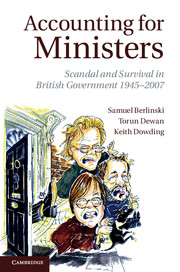Book contents
- Frontmatter
- Contents
- List of figures
- List of tables
- Preface and acknowledgements
- 1 Introduction
- 2 Managing the cabinet: principal–agent relations in government
- 3 The structure of British government
- 4 Who serves in government and how long do they last?
- 5 The prime minister and cabinet
- 6 Performance measures and forced exits
- 7 Ministerial performance and tenure
- 8 Conclusion
- References
- Index
3 - The structure of British government
Published online by Cambridge University Press: 05 April 2012
- Frontmatter
- Contents
- List of figures
- List of tables
- Preface and acknowledgements
- 1 Introduction
- 2 Managing the cabinet: principal–agent relations in government
- 3 The structure of British government
- 4 Who serves in government and how long do they last?
- 5 The prime minister and cabinet
- 6 Performance measures and forced exits
- 7 Ministerial performance and tenure
- 8 Conclusion
- References
- Index
Summary
As stated in the previous chapter, the principal–agent approach offers a rich theoretical approach for investigating relations in parliamentary democracy. In this book we use data from the British case to illustrate how selection and incentives operate under the cabinet system in the United Kingdom. Our choice of the system of government in the UK as the source of our investigation is deliberate, and is prompted by the comparatively unconstrained nature of the prime minister's powers over her ministers. The task of this chapter is then to introduce the nature of cabinet government in the UK. We begin by describing the constitutional requirements of forming a government in the UK. We briefly discuss the history of cabinet government in the UK and introduce the notions of individual and collective responsibility. We define the different levels of ministers we discuss in the book and what their responsibilities are and discuss the job, or rather jobs, of each. We end with a discussion of what sort of ministers and cabinet a prime minister would ideally like, and briefly consider some of the constraints upon that choice. We discuss the ideas of individual and collective ministerial responsibility. These two forms of accountability lie at the heart of ministerial accountability and whilst they are, in some ways, mutually supportive notions, they also work, so we shall demonstrate in this book, in contradictory fashions. The tensions inherent in these twin notions are a major source of political problems within British government.
- Type
- Chapter
- Information
- Accounting for MinistersScandal and Survival in British Government 1945–2007, pp. 21 - 53Publisher: Cambridge University PressPrint publication year: 2012



